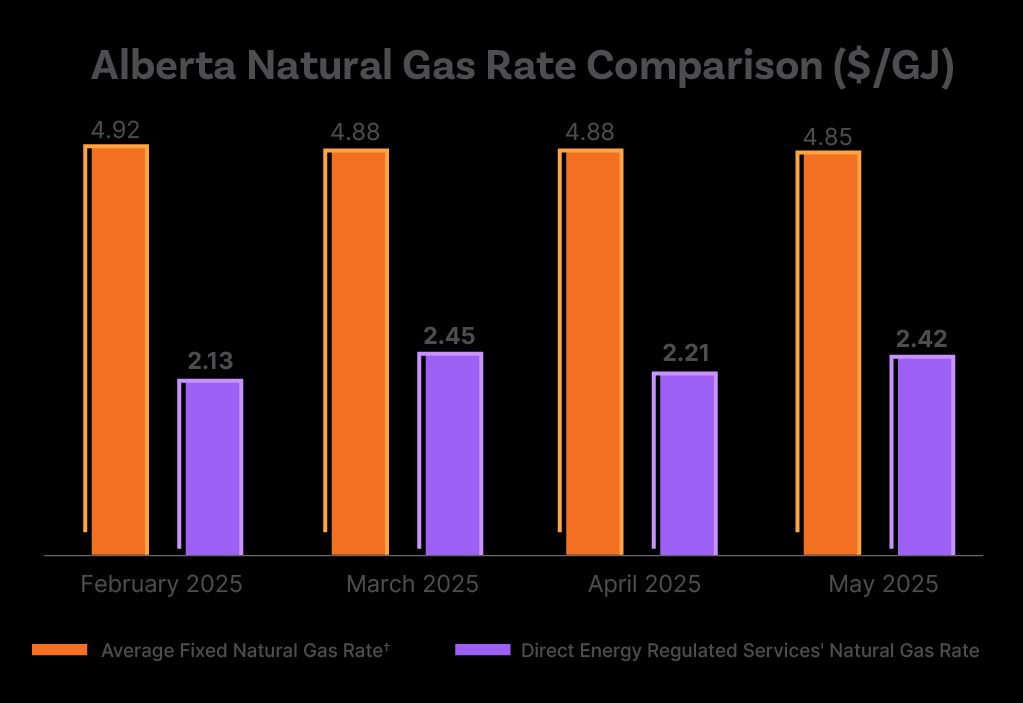





Wondering what these changes to regulated electricity rates will be and how it could affect you?
Did you know our regulated natural gas rate is 83% lower* than the average fixed rate? The best part is that it's expected to remain low throughout 2024!**
In 2023, our regulated natural gas customers saved over $300*** in energy costs compared to those who signed a fixed-rate contract at the start of the year. But it’s not too late to enjoy savings.
Switch today and take advantage of this low natural gas rate without any enrollment or exit fees. It's a simple and hassle-free process that can help you save money effortlessly.






Below are the rates available for this area






If your energy bill is higher than usual, and you're NOT on Average Billing, it is likely due to one or more of these reasons:
1. Your billing period has changed.
If your bill is higher than usual, check the billing period dates for that cycle. We do our best to provide you with a consistent billing period of about 1-month. But, sometimes, there are delays in receiving consumption information from the distribution company. These delays can result in a longer billing period.
More days in the billing period will show more consumption, increasing your energy, administration, distribution and government charges. Also, if this is a final bill or if there is a missing invoice, the billing period may be longer than usual.
2. Extreme hot or cold weather
Exceptionally cold or hot periods during the year lead to more energy usage. A typical residential customer during January consumes 20 GJ per month. However, extraordinary cold spells coupled with more time spent at home could typically contribute to higher usage than that estimate.
We turn up our furnaces or air conditioning units to stay comfortable! Cold temperatures will have an impact on both electricity and natural gas bills. However, hot temperatures are likely only to impact electricity bills as the furnace doesn't run during these times.
3. Distribution charge increases
When you use more energy, not only will your energy charges increase, but your distributor charges will also increase. This increase is because transmission and distribution charges have a variable component. Therefore, the more energy you use, the higher they will be. For natural gas bills, higher usage will also result in a higher Federal Carbon Tax because the government charges it per GJ.
4. Increased energy consumption
With colder weather, energy use generally increases. Your furnace must burn more natural gas to keep your home at the same temperature as on mild days. Electricity operates the furnace's fan, while electric heat and space heaters will also increase your electricity usage. Shorter days in the winter will also result in using the electric lights longer.
5. Other changes that can increase energy consumption
Other changes in your home environment, like turning up the thermostat, running the AC more regularly, and adding or changing appliances (i.e. hot tub, electric fireplace, air conditioner), can increase consumption. In addition, having house guests or not keeping up with furnace maintenance and filter changes can result in higher energy bills.
6. An increase in the price of natural gas or electricity
Even if your usage remains the same, regulated natural gas and electricity prices fluctuate monthly. Fluctuations can happen due to weather, increases or decreases in use, world events and supply and demand factors.
If the commodity price increases while your usage remains constant, it will result in a higher bill. Remember that our rates are reviewed and approved by the Alberta Utilities Commission to ensure they are fair and set using our approved method.